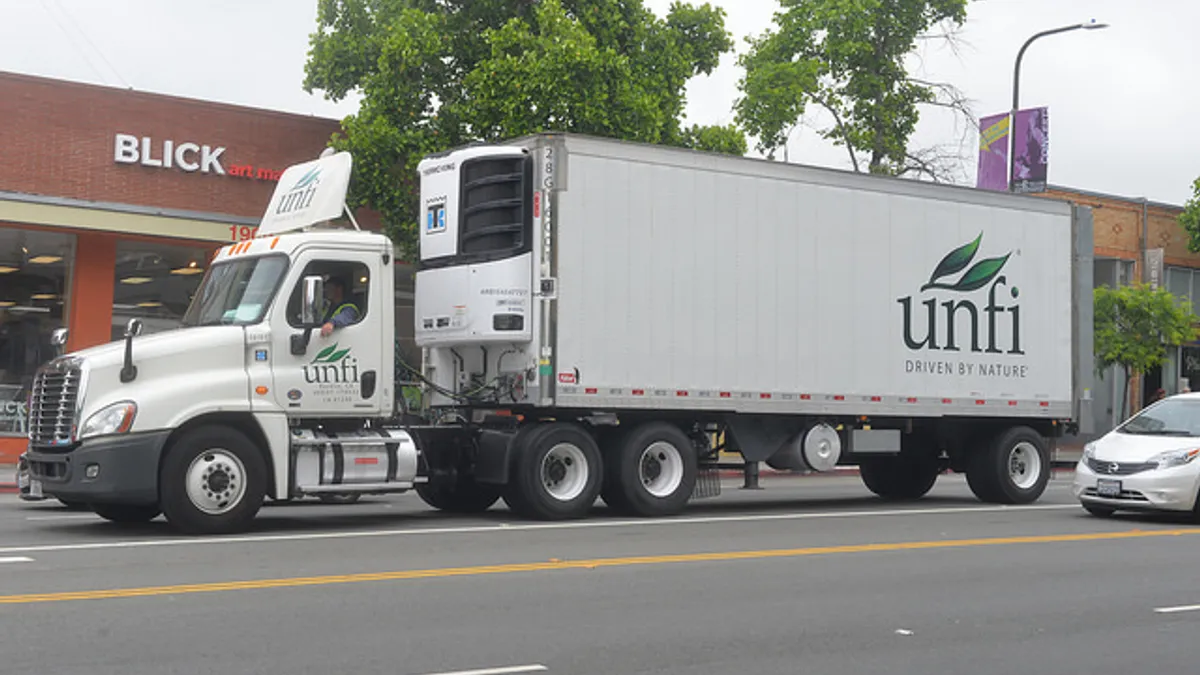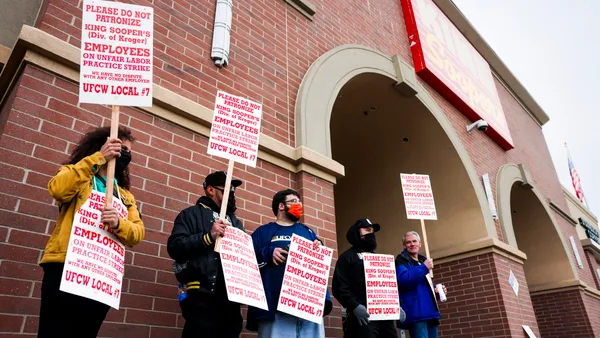Dive Brief:
- United Natural Foods, Inc. reported earnings per share of 59 cents for the first fiscal quarter of 2019 — well below the 73 cents analysts anticipated. The company chalked up the results to various factors including sales pressures, supplier out-of-stocks, high labor costs and higher-than-expected integration costs, as well as a soft performance from newly acquired Supervalu. Net sales for the company were up 16% to $2.87 billion.
- UNFI introduced new fiscal 2019 guidance that incorporates Supervalu for the first time. The combined companies expect $21.5 billion to $22 billion in net sales and adjusted earnings of $1.69 to $1.89 per share. That's down from the $3.48 to $3.58 per share range the company made earlier this year, which didn't incorporate Supervalu.
- "In the near term, industry headwinds have challenged our results," CEO Steve Spinner said during the company's earnings call yesterday. "However, the creation of value associated with this acquisition is sound. It will take some time to fully integrate the two businesses, but we are quickly coming together as a company without equal."
Dive Insight:
As Spinner pointed out, top-line growth didn't make its way to the bottom line in Q1 as UNFI dealt with familiar headaches, as well as new challenges associated with its integration of Supervalu.
The same pressures facing retailers, including fragmentation and the growth of online selling, are also pressuring UNFI and Supervalu's business, he said. In addition, soft sales along with higher-than-expected integration and financing costs with Supervalu factored into a weaker-than-expected quarter and earnings outlook. Supervalu was officially acquired on Oct. 22 and thus contributed one week's worth of sales to UNFI's Q1. UNFI also continues to see most of its growth coming through Whole Foods, which is a large but also low-margin customer.
Supplier out-of-stocks, meanwhile, have been an issue in the past for the distributor, and in this most recent quarter were 80 basis points higher than the same period last year, Spinner noted.
"Our suppliers' ability to fill our demand has continued to be a headwind and is negatively affecting our sales growth," he said.
Asked during a question-and-answer session with analysts what seems to be contributing to out-of-stocks, Spinner pointed to limited supply capacity from co-packers in the natural and organic space, and retailers' inability to raise prices. He said he expects supplies to improve in the months ahead and CPG companies to adjust.
Spinner also pointed to high labor costs as an issue, but said the distributor has implemented best practices to stabilize worker turnover and improve training at warehouses.
UNFI executives said they're confident the integration of Supervalu into the business will help alleviate some of these struggles. The combination of the two companies, they said, will create a wider assortment and customer base, increase efficiencies and offer a broader range of services and technologies.
The work isn't going to be easy, though.
"UNFI's management has an extraordinarily difficult road ahead integrating Supervalu while at the same time trying to stabilize the underlying businesses, all while under the pressure of a heavily levered balance sheet,” analysts at Wolfe Research wrote in a note to clients.
Regarding UNFI's remaining retail assets, which include Cub Foods, Shoppers Food & Pharmacy and some Shop 'n Save locations along the East Coast, Spinner said he's confident the company will find buyers. Ideally, UNFI will sell to retailers that will maintain distribution through Supervalu — as with Coborn's, which recently bought Hornbacher's. That arrangement, however, is flexible for Shoppers Food & Pharmacy, which has been gradually selling off units. Spinner said he's more confident UNFI will strike a deal for Cub that will include a supply contract.
In recent months, the company has said it aims to find a single buyer for Cub's 81 stores rather than selling to multiple retailers, as it did with its Farm Fresh sale earlier this year.
Near-term pressures combined with significant integration work will make for a difficult year ahead. But executives are confident they are creating long-term value that will make the new UNFI the strongest wholesaling business in the country.
"We have no doubt the combination of UNFI and Supervalu will translate into more value for shareholders than UNFI as a standalone company over time," said Spinner.













